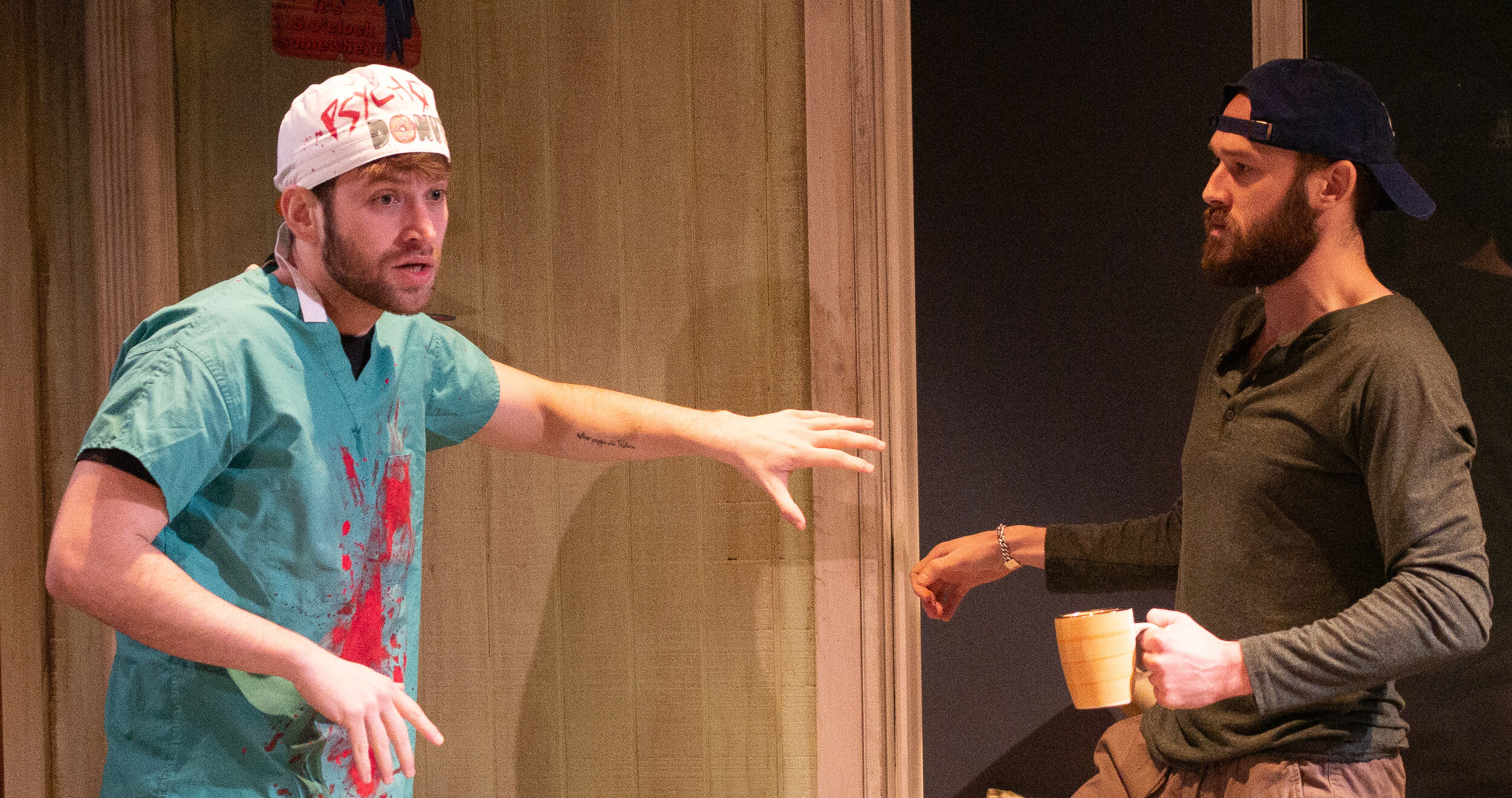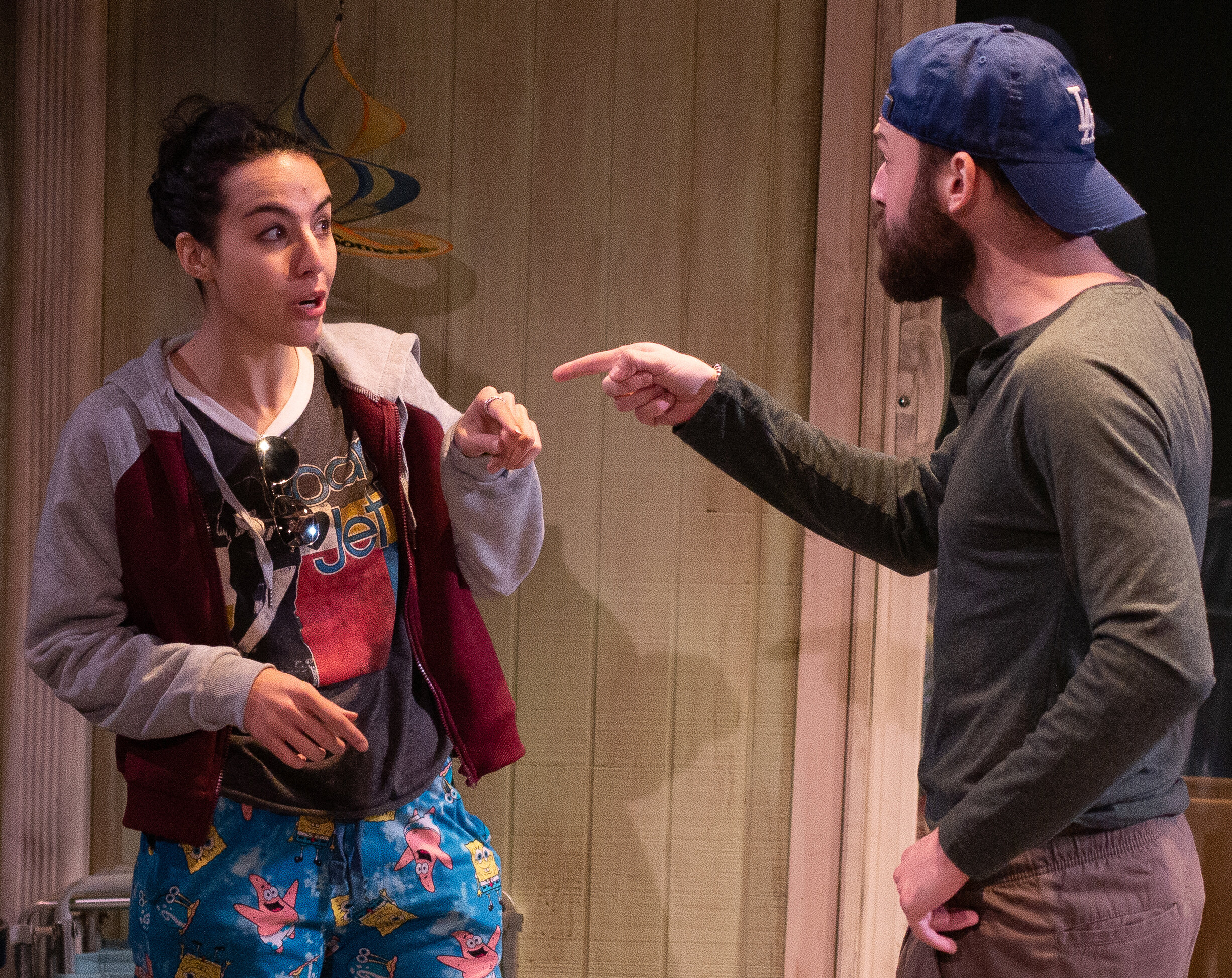Evan Hall (left) is Jack and Domenica Feraud is Amanda in Alex Riad’s The Wild Parrots of Campbell at the Cherry Lane Studio Theatre.
It’s possible that The Wild Parrots of Campbell, set in a suburb of San Jose, may call to mind the 2003 documentary The Wild Parrots of Telegraph Hill. Whether the parrots in the film have by now migrated to the South Bay is not a concern of playwright Alex Riad’s grim nuclear-family drama. They’re barely a side note in a work that doesn’t have ornithology on its mind.
Hall with Adrian Burke as Kevin.
In the back yard of what appears to be a tract home designed with superlative shabbiness by Sean Gorski—drainpipes, chaise longue and plastic molded chairs, with garbage containers around a corner—the action unfolds. Five people currently occupy the house, including two brothers. Jack (Evan Hall) is a bearded and cynical fellow, rescued from near homelessness by his younger sibling, Charlie (John DiMino), who has inherited the house from their late mother, a woman whom the disinherited Jack loathed.
Charlie has two renters, an always-hungry, easygoing fast-food worker named Kevin (Adrian Burke) and a punk-rock band’s lead singer, the lesbian Nikki (Kasey Lee Huizinga), who has spent the last decade helping Charlie to care for his mother and feels like she was an adopted daughter. The last occupant, of only three days, is Amanda (Domenica Feraud), a woman Charlie met on the Internet. She is a professional online poker player, and successful at it. Charlie has fallen in love with her and invited her to stay in order to get to know the real person.
Feraud and John DiMino as Charlie.
Wild Parrots isn’t a drama that breaks any molds: family strife, quirky characters, and the stranger who disrupts a settled existence are staples of American theater in particular. The central characters here are millennials—plus Jack, who is 31. The brothers have survived to adulthood despite having a mother who was an addict, yet they carry a legacy of emotional ruin.
“We can keep mashing people together in this house over and over again,” Jack tells Charlie, “but that’s never gonna change the fact that we’re just a little bit broken.” In several scenes, under Padraic Lillis’s superb direction, it’s clear that the five young actors are making a feast of their roles. Foremost among them is Hall as Jack, who smokes and drinks, and who bristles at the rosy family memories Charlie recounts:
Couldn’t have been more than a few years old. I remember all of mom’s friends hanging around here all the time. They were sleeping on the floor. Playing board games. Making art in the living room. Cooking these communal dinners with their hands caked in paint and clay. Everyone felt so happy.
Jack responds that “our mother was a fucking drug addict. … Her friends weren’t sleeping on the floor because this was some hippie commune. … They were sleeping on the floor because that’s where they were fucking shooting up. Our good old mom included.” Hall gives a detailed rendering of Jack. Watch as he approaches Amanda from behind, unwilling to startle her, so he slightly dips his body to come into her field of vision. And he excels in that hoary standby, the drunken monologue.
Hall’s Jack confronts the abrasive Nikki (Kasey Lee Huizinga). Photographs by Sean T. McGrath.
Charlie works hard at building a relationship with Feraud’s laconic, mousy Amanda, who casts a skeptical eye on the household. DiMino imbues Charlie with a sheepish innocence, plus earnestness and optimism that are beguiling. But Amanda remains aloof to his friends at the New Year’s Eve party that opens the play. (Matt Otto provides offstage party music and muffled loudness, as well as distant fireworks.)
Amanda particularly irritates Nikki, and Huizinga invests the musician with resentment and sardonic humor, though Jack pulls her back from naked hostility toward Amanda. Burke brings a hangdog, comic air to the hapless Kevin, who spouts bizarre observations like “Dolphins rape.” When Nikki berates him with “All you do is play video games and smoke weed in your room,” his rejoinder is “That’s a little reductive.” He’s a bright spot in a long play that is never dull but is decidedly downbeat.
Almost inevitably there’s a tension between the brothers over Amanda, and it feels forced. The plot calls for Jack to be hung up on Amanda, but there’s little chemistry between the two, and the lack of it stifles one’s belief in their attraction.
The parrots, by the way, constitute a tacky décor in the back yard, and one of the real ones repeats an awkward, revelatory statement at an inopportune time. But the bird world isn’t the real reason to see Wild Parrots. It’s Hall, who electrifies a play that refashions tried-and-true dramatic elements for the 21st century.
The NOW Collective’s production of The Wild Parrots of Campbell runs through Dec. 21 at the Cherry Lane Studio Theatre (38 Commerce St.). Evening performances are at 7 p.m. Tuesday through Saturday; matinees are at 2 p.m. Sunday. For tickets and information, call OvationTix at (866) 811-4111 or visit nowcollective.org.






